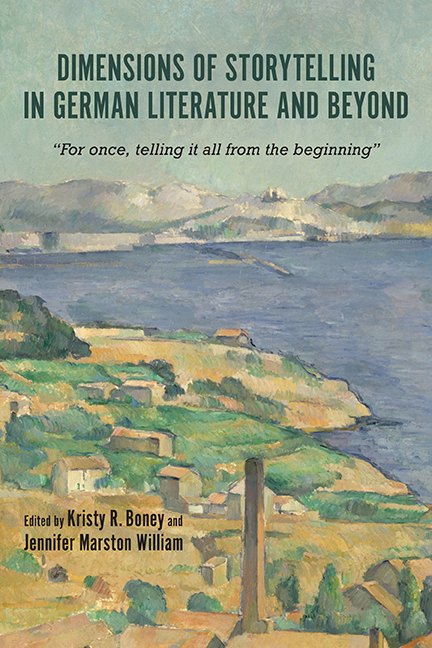 Dimensions of Storytelling in German Literature and Beyond
Dimensions of Storytelling in German Literature and Beyond Book contents
- Frontmatter
- Contents
- Acknowledgments
- Introduction: The Social, Political, and Personal Dimensions of Storytelling
- Part I Anna Seghers: A Missing Piece in the Canon of Modernist Storytellers
- Part II Expressions of Modernity: Using Storytelling Unconventionally
- Part III The Personal Narrative: Storytelling in Acute Historical Moments
- 14 Problems and Effects of Autobiographical Storytelling: Als Pimpf in Polen: Erweiterte Kinderlandverschickung 1940–1945 (1993) and A Hitler Youth in Poland: The Nazis’ Program for Evacuating Children during World War II (1998)
- 15 Too Near, Too Far: My GDR Story
- 16 Conflict without Resolution: Konrad Wolf and the Dilemma of Hatred
- 17 “Bleibt noch ein Lied zu singen”: Autobiographical and Cultural Memory in Christa Wolf's Novel Kindheitsmuster
- 18 Narrating germany's past: a story of exile and the return home—a translation of the chapter “above the lake” from ursula Krechel's Novel Landgericht
- 19 Storytelling in the GDR: An Interview with Eberhard Aurich and Christa Streiber-Aurich
- Notes on the Contributors
- Index
18 - Narrating germany's past: a story of exile and the return home—a translation of the chapter “above the lake” from ursula Krechel's Novel Landgericht
from Part III - The Personal Narrative: Storytelling in Acute Historical Moments
Published online by Cambridge University Press: 12 April 2019
- Frontmatter
- Contents
- Acknowledgments
- Introduction: The Social, Political, and Personal Dimensions of Storytelling
- Part I Anna Seghers: A Missing Piece in the Canon of Modernist Storytellers
- Part II Expressions of Modernity: Using Storytelling Unconventionally
- Part III The Personal Narrative: Storytelling in Acute Historical Moments
- 14 Problems and Effects of Autobiographical Storytelling: Als Pimpf in Polen: Erweiterte Kinderlandverschickung 1940–1945 (1993) and A Hitler Youth in Poland: The Nazis’ Program for Evacuating Children during World War II (1998)
- 15 Too Near, Too Far: My GDR Story
- 16 Conflict without Resolution: Konrad Wolf and the Dilemma of Hatred
- 17 “Bleibt noch ein Lied zu singen”: Autobiographical and Cultural Memory in Christa Wolf's Novel Kindheitsmuster
- 18 Narrating germany's past: a story of exile and the return home—a translation of the chapter “above the lake” from ursula Krechel's Novel Landgericht
- 19 Storytelling in the GDR: An Interview with Eberhard Aurich and Christa Streiber-Aurich
- Notes on the Contributors
- Index
Summary
URSULA KRECHEL (born 1947 in Trier) first gained renown primarily as a poet in West Germany during the 1970s, although her first major creative work, the play Erika (1973), met with success and was translated into five languages. Erika established Krechel early on as a writer focused on women-centered themes, but also initially limited her access to grants and fellowships for precisely that reason. An independent author from the start, Krechel built on this early achievement by spending much of her time in the following years concentrating on her principal genre, poetry, whose volumes yielded a measure of critical acclaim though little in the way of monetary reward or earned income. She experienced firsthand the difficulties of attempting to make a living from writing poetry. Thus throughout her career she has also always published in other genres: nonfiction, such as an early handbook about the women's movement, writing and authors’ guides, and reviews of others’ literary works, as well as essays in newspapers and periodicals; mostly short-form fiction; and radio plays. However, her recent success has come from two lengthy novels, Shanghai fern von wo (Shanghai Far from Where, 2008) and Landgericht (State Justice, 2012), which have garnered respected literary awards, the Joseph Breitbach Prize and the German Book Prize respectively. These two works are based on years of meticulous historical research that the author conducted in China and Europe, and on the lived experiences of German and Austrian Jews during the Nazi period, the Holocaust, and the postwar years in the Federal Republic.
Krechel's poetry has itself often tended toward the narrative strand of the genre, although she has also published frequently esoteric as well as occasionally linguistically experimental verse. While not a writer of ballads like her contemporary and acquaintance Helga M. Novak (1935–2013), in several of her early poems Krechel relates real or imagined experiences, as in, for example, the elegiac “Meine Mutter” (My Mother) and in the dream-sequence “Nach Mainz!” (To Mainz!), both from the collection named for the latter piece (1977). More recently, Krechel's long poem Stimmen aus dem harten Kern (2005; Voices from the Bitter Core, 2010) speaks from the soldier's perspective from battlefields around the globe and across centuries. The cacophony it provides brings the all-pervasiveness of war to our senses by way of those who live and die on the front lines.
- Type
- Chapter
- Information
- Dimensions of Storytelling in German Literature and Beyond“For once, telling it all from the beginning”, pp. 234 - 251Publisher: Boydell & BrewerPrint publication year: 2018


